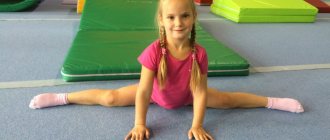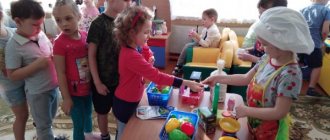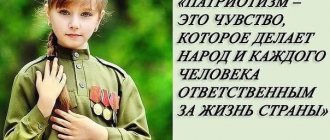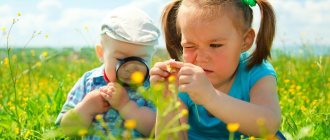CHILDHOOD GUIDE
Methodological recommendations “Modern methods for developing healthy lifestyle habits in preschoolers”
Eliseeva Lyubov Aleksandrovna, teacher of MBDOU No. 15, Kolomna
Work on developing healthy lifestyle habits should be implemented through a series of systematic activities , the basis of which are daily exercises. Many children's actions should be made so familiar that they are performed automatically. For example, the habit of rinsing your mouth after eating, combing your hair, and others. Some educational tasks gradually become more complicated, while others remain unchanged for children of any age. For example, the actions of caring for the premises, clothing, and providing first aid become more complicated. The group must create conditions for the development of cultural and hygienic skills; everything must be accessible and attractive to children.
Children of primary preschool age are taught in a playful way; in middle and senior preschool age, the teacher analyzes various problem situations and conducts experiments . By observing themselves, examining themselves in the game, preschoolers learn to provide first aid: treat minor scratches, abrasions, apply compresses to bruises. The main thing is to teach how to act correctly in case of illness or injury, and to be able to describe your condition. Attention should also be paid to bad habits (smoking, drinking, drug addiction), condemning them, revealing to children their negative impact on human health.
The group should create an emotional and psychological environment that is comfortable for the child’s nervous system. In the morning, the teacher greets the children warmly and asks what the child’s mood is. During the day, the teacher, in order to relieve the children’s growing excitement and fatigue in games or during any other activity, conducts “musical breaks” and “minutes of silence.” When working with children, it is proposed to carry out relaxation exercises - this is one of the ways to overcome internal tension, based on more or less conscious muscle relaxation.
Regular moments can be organized in different ways, but in each of them the teacher must think through his communication with children. For emotional relief and for games in the group, there should be a cozy corner or screen where the child can retire for some time and “relax.” contribute to the development of the need for daily physical exercise . When introducing preschoolers to various sports, it is necessary to use visual material. It is recommended to organize sports events for children and parents: “Dad, Mom and I are a sports family”, “Visiting Neptune”, “Sun, air and water are our best friends”. During the holidays, it is advisable to hold a New Year's holiday “Health”.
For independent motor activity of children in the group there should be a sports corner with various attributes: balls, skittles, mats, flags, ribbons, ring throws, etc. To prevent flat feet, ribbed boards and massage paths (mats with various fillings: pebbles, sand) are used.
Children should develop an understanding of the dependence of the health of the body on the food they eat . “Food should not only be tasty, but also healthy.” During meals, it is necessary to talk about the benefits of a particular dish or product. At a younger age, you can use the game moment. At an older age, you should talk more about the benefits of the food you eat. Children also need to be taught about the rules of proper nutrition. In older groups, these rules, made schematically, can be hung somewhere and regularly recalled by telling Dunno, Burik the Bear or other fairy-tale characters about them. Experiments are carried out with children of older and preparatory age . An excursion to the kitchen helps preschoolers learn how and what lunch is prepared from, and an excursion to the medical office and a conversation with a doctor or nurse will help children learn about the connection between nutrition and human health and what food and why is called healthy and what is not. harmful.
To reinforce with children the concepts of healthy food and vitamins as a source of good mood and health, didactic games are held: “Healthy and tasty food”, “Where the vitamins are hidden”, “Choose and draw healthy foods”, “Fill the baskets”. To familiarize children with the content of vitamins in food, it is advisable to organize a “Vitaminka” cafe in the group , where children also take a second breakfast: milk or juices. During the “Health Day”, fruit or vegetable salads are prepared for preschoolers, which are treated to parents or kindergarten employees.
The theme of healthy lifestyle runs through all types of child activities : applique, modeling, drawing, “The World Around Us” classes and others. Poems, nursery rhymes, riddles, proverbs and sayings, audio recordings, video recordings will help make classes more interesting and exciting. To consolidate healthy lifestyle skills, Health Days should be held once a month, and on holidays - Health Week.
Issues of developing the habit of leading a healthy lifestyle in children should be resolved in close contact with the family . In planning and carrying out such work, a great help is provided by surveying parents, which helps to learn more about the child, his physical development, and also to outline the most important and effective forms of pedagogical propaganda. Along with traditional forms of working with families (home visits, setting up stands and parent corners, holding meetings, consultations), business games, trainings, and involving parents in classes, in “Health Days,” in physical education holidays and leisure activities can be used.
The most complete way to learn the above material is through training sessions , during which the teacher follows the following scheme: - help the child understand why he needs to do this;
— teach certain actions in a fun way: washing your hands, brushing your teeth, etc.; — teach to perform these actions daily, regularly. Organization of physical education and health work with preschoolers to introduce them to a healthy lifestyle Formation of a healthy lifestyle of preschoolers in the process of physical education and cognitive activities Modern types and methods of speech interaction when perceiving a picture Formation of habits of safe behavior on the streets in preschoolers through play activities >
Formation of healthy lifestyle skills in kindergarten
Formation of healthy lifestyle skills in preschool children in a preschool educational institution
Description of the material: I offer you an article on the formation of healthy lifestyle skills in preschoolers attending kindergarten on the topic “Formation of healthy lifestyle skills in preschool children in a preschool educational institution” . This material will be useful to parents of preschool children and teachers in preschool institutions. Preschool education is aimed at the formation of a general culture, the development of physical, intellectual, moral, aesthetic and personal qualities, the formation of prerequisites for educational activities, the preservation and strengthening of the health of preschool children.” / Federal Law of the Russian Federation “On Education in the Russian Federation” No. 273-FZ of September 1, 2013. Article 64 clause 1 Pre-school education. Preschool education is a very short period in a person’s life. Forming healthy lifestyle habits is one of the key goals in the preschool education system. And this is understandable - only a healthy child can develop harmoniously. Protecting and strengthening the physical and mental health of children, including their emotional well-being, is the main task of the Federal State Educational Standard for Preschool Education. Preschool age is decisive in the formation of the foundation of physical and mental health. Until the age of seven, a child goes through a huge developmental path that is not repeated throughout the rest of his life. It is during this period that intensive development of organs and the formation of functional systems of the body takes place, the main personality traits are laid, character and attitude towards oneself and others are formed. That is why, from an early age, it is necessary to involve a child in taking care of his health, to instill in him interest and activity in self-development and self-preservation. Work in this direction is only advisable together with the family , since the important subject of the initial link of the system is the family. It creates conditions for the primary orientation of children in organizing a healthy lifestyle. The family urgently needs the help of specialists at all stages of preschool childhood. It is obvious that family and kindergarten, having their own special functions, cannot replace each other and must interact for the sake of the full development of the child. The main task of the educator and parents in introducing a healthy lifestyle is to form a reasonable attitude towards their body, teach them to lead a healthy lifestyle from early childhood, and master the necessary sanitary and hygienic skills. Parents should support at home the principles of developing a healthy lifestyle in optimal combination with all health-saving measures carried out in kindergarten. The habit of a healthy lifestyle is the main, basic, vital habit; it accumulates the result of using the available means of physical education for preschool children in order to solve health, educational and educational problems. Therefore, the preschool institution and the family are called upon to lay the foundations of a healthy lifestyle in preschool childhood, using various forms of work. It is in the family, in a preschool educational institution at an early stage of development that a child should be helped to understand the enduring value of health as early as possible, to realize the purpose of his life, to encourage the child to independently and actively form, maintain and increase his health. A healthy lifestyle is not just the sum of acquired knowledge, but a lifestyle, adequate behavior in various situations. Children may find themselves in unexpected situations on the street and at home, so the main task is to develop their independence and responsibility. Everything we teach children, they must apply in real life. The formation of cultural and hygienic skills in preschool children is one of the most important in raising children of this age. And how well it is initially thought out, planned and organized depends on whether it will promote health, physical and mental development, as well as fostering a culture of behavior. Hygienic culture is as important for a person as the ability to speak, write, and read. Self-care gives a person a feeling of cleanliness and health. It is necessary to accustom the child to hygienic individualism: his own comb, his own bed, his own potty, his own handkerchief, his own towel, his own toothbrush. Bring children to understand that keeping their body clean is important not only to protect their personal health, but also the health of others. In kindergarten, the teacher teaches students to take care of their health and the health of others, develops personal hygiene skills, gives knowledge about healthy food, and guides children towards a healthy lifestyle. Ways to solve problems: direct educational activities, games-activities, visual arts, walks, hygiene procedures, hardening activities, games, sporting events, holidays, conversations, reading literature, the use of emotionally attractive forms. Training should be organized not only in the classroom, but also in all routine moments when situations arise that prompt children to make a decision about this problem. Undoubtedly, parents should be the main allies in this work. From the first days of meeting them, the teacher shows and tells everything that awaits their children in kindergarten, paying special attention to issues related to the children’s health. Listens to their requests regarding the child’s food, sleep, and clothing. All medical and hardening procedures are carried out only strictly with the consent of the parents. First of all, we should direct the work and prove that without their participation we will not be able to achieve good results, only they are the brightest example for their children. Family and kindergarten are two educational institutions , each of which has its own special content and gives the child a certain social experience. For these purposes, various forms of cooperation are widely used: conversations, consultations, seminars, parent meetings, joint holidays, surveys. Conducting open days with demonstrations of methods and techniques of working with children, showing different types of physical education activities with preschool children. Involving parents to participate in the life of the kindergarten. Colorful visual stands introduce parents to the life of a kindergarten, the Convention on the Rights of the Child, and the age characteristics of children. In the corners for parents there is practical information using interesting facts, recommendations from the teacher and specialists. As a result of such work, using various forms and methods of communication with parents, the pedagogical literacy of parents increases; The culture of interpersonal interaction between children in kindergarten is improving. Thus, working in close cooperation with parents on the issue of developing a healthy lifestyle in preschool brings positive results , the proposed ways on this issue are effective and allow us to solve one of the most important tasks prescribed by the federal state standard of preschool education.
We recommend watching:
Formation of a healthy lifestyle in preschool children through valeology Conversation with game elements, for children of the senior group on the topic: Healthy lifestyle Health-saving technologies in the development of preschool children through outdoor games Conversation for children of the preparatory group. Tuberculosis Day
Similar articles:
Proverbs and sayings for preschool children about health
Word games on a sports theme for older preschoolers
Conversation “Good and bad habits” in the senior group
Work experience “Formation of healthy lifestyle habits in preschoolers”
Natalia Lebedeva
Work experience “Formation of healthy lifestyle habits in preschoolers”
Childhood is a unique period of a person’s life , during which health is formed . Everything that a child acquires in childhood is preserved for life . You can teach a child to run, jump, and ski well, but if he does not have a motivated need for this, all these skills will be useless in life . It is important to teach your child to understand how valuable health is for a person and how important it is to strive for a healthy lifestyle . A healthy lifestyle is not just the sum of acquired knowledge, but a lifestyle , adequate behavior in various situations.
Full physical development and health of a child is the basis for personality formation . health problem is currently being considered in a broad social aspect: as mental and social well-being. A person is prosperous and therefore healthy if positive emotions predominate in him.
Currently, one of the priority tasks facing educators is preserving the health of children in the process of education and training. The formation of a healthy lifestyle should begin in kindergarten.
The habit of a healthy lifestyle is the main , basic, vital habit ; it accumulates the result of using the available means of physical education for preschool in order to solve health , educational and educational problems. Therefore, the preschool institution and the family are called upon in preschool childhood to lay the foundations of a healthy lifestyle , using various forms of work . And it is in the family, in a children's educational of health as early as possible , to realize the purpose of his life , to encourage the child to independently and actively form , maintain and increase his health .
That is why any general educational institution ( and first of all kindergarten)
should become
a “
healthy lifestyle ” for children.
Where any of their activities will have a health-pedagogical focus , and will help develop their habits , and then the needs for a healthy lifestyle , the formation of skills for making independent decisions regarding maintaining and strengthening their health .
Therefore, in my work I set myself the following goal: to form in children ideas about a healthy lifestyle as an active activity aimed at preserving and strengthening health .
The goal is realized through solving the following tasks:
To give children a general idea of health as a value, to teach them to take care of their health and take care of it .
Assist children in developing healthy lifestyle habits , instilling and consolidating cultural and hygienic skills.
Expand children's knowledge about nutrition, its importance, and the relationship between health and nutrition .
Introduce children to factors influencing human health (environment, sleep, physical activity)
.
The implementation of work to promote a healthy lifestyle in children was carried out as follows :
To carry out educational work, I try to create favorable conditions in the room: we organize cross-ventilation in the absence of children, maintaining the air temperature in the group at 20 -22 ° C.
Every morning morning exercises are carried out, the purpose of which is
– create a cheerful, cheerful mood in children , improve health , develop dexterity and physical strength. In addition to morning exercises, carried out in the traditional form , I conduct them in the form of musical and rhythmic movements. Exercise is also valuable because children develop the habit of doing various exercises every day in the morning. Over time, this useful habit turns into a need and remains with the person for life .
In addition to daily morning exercises, I conduct physical exercises and outdoor games with children. Their goal is to educate children
correct execution of movements, various exercises aimed at developing body coordination and increasing independent motor activity.
In the process of creating a healthy lifestyle, I try to develop basic hygiene skills in children. I teach children to roll up their sleeves, lather their hands well with soap, rinse them thoroughly, wash their face, wipe dry with a personal towel, and use a handkerchief. Some children do not dry their hands well after washing, leaving them semi-damp. I talk to such children individually, I explain that it is better to do this diligently and thoroughly, to wipe each finger - this is very useful, the hands will not freeze and the fingers will be happy to have a massage. When developing cultural and hygienic skills, I use the following techniques:
as demonstration, explanation, direct assistance, encouragement, individual conversation. When carrying out work , I use positive assessment, praise, and encouragement. It is known: praise spurs, but an angry word, on the contrary, offends.
During the educational process, a series of conversations were held with children: “Me and my health ”
,
“How to wash your hands correctly”
,
“What are vitamins”
,
“Healthy and unhealthy foods”
,
“Why do exercises”
,
“What are mittens for”,
etc.
Game exercises to develop a healthy lifestyle : “We know how to eat beautifully”
,
“Clean
palms ” ,
“Obedient combs”
, etc.
I also use a system for effectively hardening children: daily walks, dousing hands with cool water, washing with cool water, walking along health paths ”
, washing your feet before going to bed (in the warm season, barefoot, lightweight
clothing , sleeping with the windows open in the warm season, etc.
I try to use the following forms of healing in my work : physical exercises and dynamic pauses, finger games, breathing and articulation gymnastics, awakening gymnastics.
During conversations, I teach children to understand the value of a healthy lifestyle , taking care of their health , and introduce them to the basic rules of safe behavior and situations that are dangerous for them. We consider visuals and posters - “Children and the Road”
,
“Home Alone”
,
“Basics of Hygiene”
, etc.
Didactic games “Healthy and Harmful Foods” a means of developing ideas about a healthy lifestyle among preschoolers.
,
“Vegetables and Fruits”
, role-playing
“Hospital”
,
“Family”
,
“Hospital”
, where children, together with the teacher, play out
life situations .
Another form of introducing children to a healthy lifestyle and health regime , which I use every day in my work with children , is gymnastics after naps. Its goal is to improve the mood and muscle tone of children, as well as take care of the prevention of posture and foot disorders. I usually start this type of gymnastics in this way : children gradually wake up to the sounds of melodic music, which evokes pleasant positive emotions. I offer exercises from different positions: lying on their side, on their stomach, sitting, standing. After these exercises, children walk along massage paths, performing corrective exercises at different paces. This type of physical activity evokes positive emotions in children and helps them quickly enter an active state after sleep, normalize blood circulation , and relieve lethargy and drowsiness.
Using relaxation exercises helps relieve tension from the muscles of the face, arms, legs, and torso. Communication games “Ship and wind”
,
“Butterfly”
,
“Thunderstorm”
,
“Ant”
develop the emotional sphere of the child.
Health days , leisure and entertainment are a good basis for the development of physical activity and learning in children. On the one hand, they consolidate the skills and abilities acquired in the classroom, and on the other hand, in an interesting and exciting way , they evoke the need to learn new things, expand their horizons, knowledge about the world around them, and teach joint actions and experiences health stations ”
,
“The good doctor Aibolit will heal us, heal us!”
.
Children's fiction contributes to the development of cognitive interest in a person and his health . Children enjoy listening and discussing fairy tales “The Magic Walrus”
,
“Colds and
Health ” ,
“Save Veronica”
, L. Voronkova
“Masha the Confused”
, poems by K. Chukovsky
“Moidodyr”
, A. Barto
“Greasy Girl”
, Z. Alexandrova
“What you took, put it back”
,
“ Stompers”
and others learn poems, guess riddles, and get acquainted with proverbs and sayings.
A conversation with children after reading a book deepens its educational impact; children establish a connection between the story and their experience and make simple generalizations.
I conduct conversations with children on the topics: “If you want to be healthy ”
,
“Our faithful friends”
,
“Cleanliness is the key to
health ” ,
“Hygiene items”
,
“Winter walk”
,
“Get ready to exercise!”
,
“Vegetables and fruits are healthy foods,”
etc.
Children learn what foods are good for the body, what vitamins are contained in fruits and vegetables, get acquainted with the structure of the human body and safe behavior in everyday life and in nature.
The habit of a healthy lifestyle is the main , basic, vital habit that is formed not only by the preschool institution , but
and family. Therefore, I create information folders for parents ( “Daily Routine”
,
“Immunity of children”
,
“Take care of
health ” ,
“Education of correct posture”
..., I provide individual consultations
“Clothing for children in a group”
,
“Clothing for children according to the season”
,
“Organizing a walk on weekends”
...
In the family, in communication with their parents, children receive their first life . As a result of a child’s communication with close adults, he gains experience in actions , judgments, and assessments, which is manifested in his behavior. Positive examples of the behavior of the father and mother as role models , as well as the parent’s word as a method of pedagogical influence, are of great importance. The main thing is that the words of the parents, their example, real manifestations, as well as assessments of the children’s behavior coincide and thereby reinforce the child’s ideas about “what is good and what is bad.”
.
Therefore, I explain to parents that at home it is important to reinforce the demands placed on children with personal behavior, specifically demonstrate examples of hygienic culture, and achieve unity in the approach to the child.
In October, three families took part in the creative photo newspaper competition “ Health and Family ”
(the Nikolaev family, the Balakin family and the Vasiltsov family, where
work was sent to a regional competition and took third place. They also took part in the II All-Russian competition “
It’s great to be healthy ” The work of forming initial ideas about a healthy lifestyle is a kind of foundation future health of children ... Therefore, this work should be carried out constantly and continuously both in the family and in a preschool institution , since children spend most of their time with us.
Perspective:
In order to increase interest in a healthy lifestyle, I plan, together with specialists and parents, to continue systematic work in this direction through joint events to create a culture of health in children , preserve and strengthen their health , and use an integrated approach in this direction




